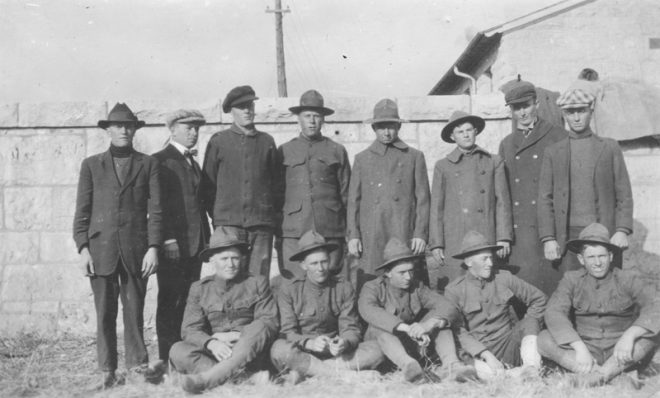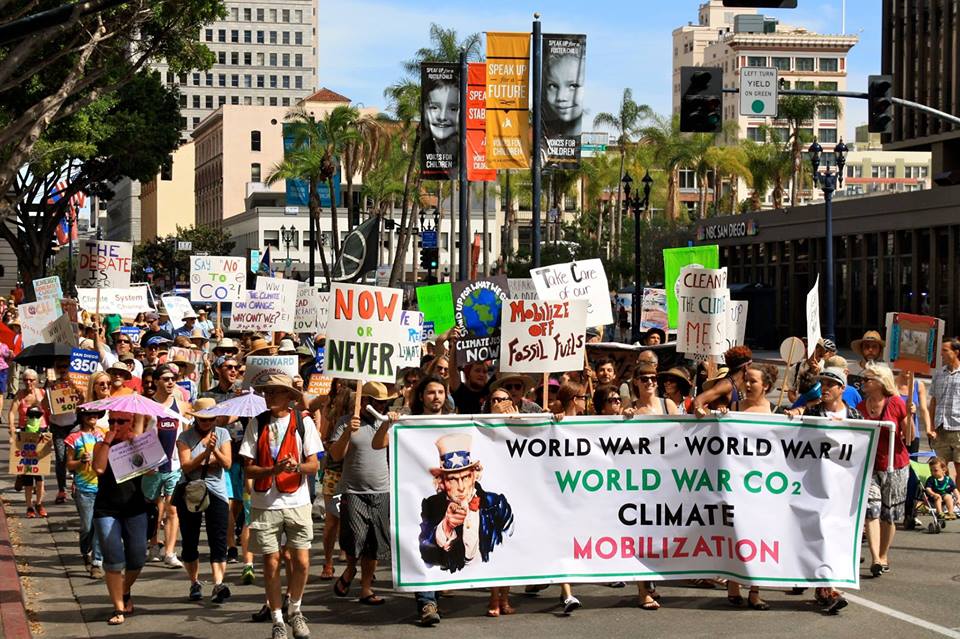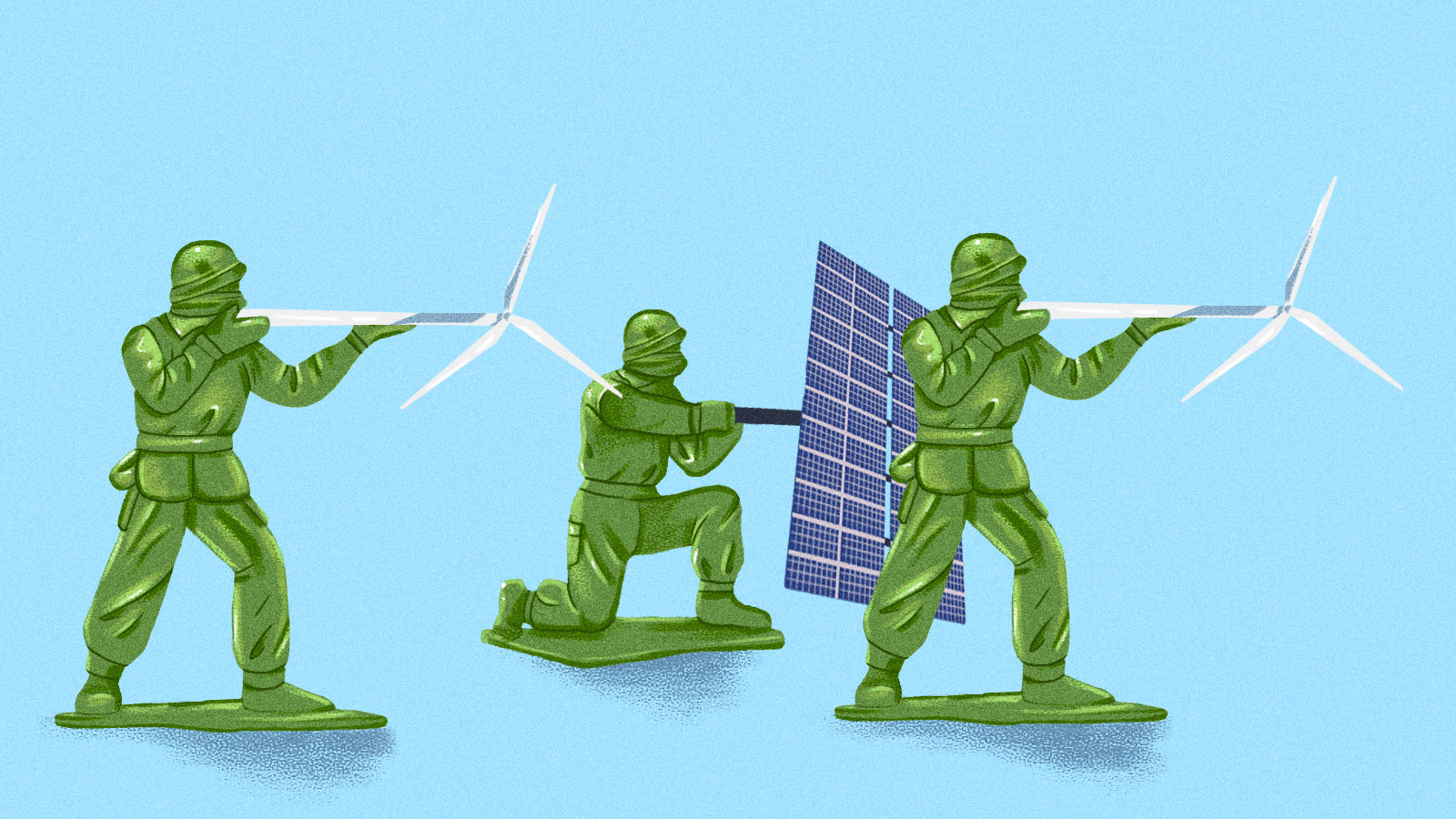Each dead house fly was worth a quarter, my mom told us kids, but I never earned any money. Every time I cornered a fly, I pictured goo marks left on the wall — spots splayed with tiny black guts and twisted legs. My half-hearted swats with an issue of National Geographic gave even the most sluggish fly time to escape.
That I genuinely couldn’t hurt a fly might have been something I picked up in church. I grew up attending a Mennonite congregation in Indiana. We weren’t the bonnet-wearing, buggy-riding sort, but we embraced some traditions, like the Anabaptist teaching of nonviolence. This sometimes expressed itself in an instinct for conflict avoidance. I took that further than most, tending to stay away from arguments, competitive sports, and eating meat.
So I was surprised when violence crept into my speech three years ago when I started working as a journalist covering climate change. Some ancient spirit took hold of me, and I found myself deploying the narrative of war. Carbon tax proposals were “battles” to be fought. Greenhouse gas emissions had to be “slashed.” As for climate change itself? Well, that was an issue to “fight” — and “eco-warriors” and “climate hawks” were leading the charge.
I’d adopted the language of the climate movement’s leaders who’d gone all out with the wartime cliches. The only way to overcome climate change inaction, environmentalist (and Grist board member) Bill McKibben once wrote, “is to adopt a wartime mentality, rewriting the old mindset that stands in the way of victory.” Hillary Clinton reportedly wanted to equip the White House with “a situation room just for climate change.” Author and activist Naomi Klein and newly elected Representative Alexandria Ocasio-Cortez, among other advocates, are calling for a World War II-scale mobilization against global warming.
The whole “fighting climate change” frame rests on the assumption that opposition is the best way to get things done. But that’s not always the case, as the linguist Deborah Tannen wrote in The Argument Culture: Stopping America’s War of Words back in 1998. Military and sports metaphors train us to see everything in terms of conflict — this side versus that side — and that perspective limits our collective imagination about what we can do to fix complex problems.
Coming from a pacifist background, and obsessed with linguistics, I’ve grown uneasy with the way war shapes our words. The thought struck me earlier this year: By pitting one group against another, do war metaphors undermine our ability to address the complex problem of climate change, the biggest global crisis we face? Are there other ways to frame our predicament and convey the sense of urgency that’s needed — without dividing us into Hatfields and McCoys?
My gut feeling was that talking about climate change as a battle between rivals will ensure our ultimate defeat. But the reality might be more complicated than that.

War narratives are everywhere, so prevalent that they usually pass unnoticed. Politicians and the media have declared wars on poverty, drugs, obesity, and terror. There’s also supposedly a war on Christmas. These wars were declared against concepts, trends, and tricky issues with no simple solutions. And none of them have been won.
Reading Tannen’s book, I saw these metaphors in a new light. There’s a “pervasive warlike culture” in the U.S. that leads us to approach just about any major issue as if it were “a battle or game in which winning or losing is the main concern,” she wrote. It’s a deeply entrenched cultural tendency that has shaped politics, education, law, and the media.
Tannen traces this American spirit back to Ancient Greece. Aristotelian philosophy sought to uncover truth through adversarial debate — an approach that shapes how we think today. Ideally, that meant a respectful argument where opponents sought middle ground. That ideal has increasingly been thrown out the window: Remember former EPA Administrator Scott Pruitt’s dream of having a military-style debate where “red-team, blue-team” scientists would debate the validity of climate change on live TV?
Hostility is definitely in fashion. Anger spreads faster across social media networks than any other emotion, as studies have shown (and anyone who’s spent more than one minute on Twitter can attest). Cable news has devolved into shouting matches.
In recent years, American discourse has been swept further and further along the River Vitriol. “Americans on both the left and the right now view their political opponents not as fellow Americans with differing views, but as enemies to be vanquished,” wrote Amy Chua and Jed Rubenfeld, two professors at Yale Law School, in a recent Atlantic essay about tribalism.
I’m wary of telling strangers that I’m a climate journalist. It’s not just that rising seas and bigger hurricanes are unpleasant topics. It’s that the simple act of documenting this global crisis is considered a political statement. Somewhere out there, someone sees me as an enemy. And I really don’t want to fight with them. It’s not in my nature.

Conscientious Objectors at Fort Riley, Kansas. c. 1918. Mennonite Church USA Archives
So here’s the important thing about this war on climate change: We’re losing it. Scientists have sounded the alarm bells for 40 years; the window to address the problem is shrinking; drastic action on greenhouse gas emissions keeps … not happening. The future of humanity is at stake. Will you join our fight for justice?
This rally-the-troops tone reminds me of the old Uncle Sam posters created during World War I. “I want you,” the poster says, with a stern Sam extending a forefinger, “for U.S. army.” It’s an aggressive moral appeal, explicitly trying to arouse an emotional reaction and a commensurate commitment. The enemy is coming. Are you with us?
In wartime, not taking sides is almost as bad as betrayal. During World War I, at least 138 Mennonites who refused military service were court-martialed and sent to jail. Many others were sent to army camps where they were ridiculed and even tortured for their commitment to nonviolence.
Maybe that’s why Uncle Sam’s message doesn’t work on me. I was raised to be suspicious of war rhetoric and nationalism. As the only Mennonite kid in my elementary school classes, I remember standing respectfully and silently as my classmates said the Pledge of Allegiance. At my Mennonite college, there was no Star-Spangled Banner before sporting events; it had too many bombs bursting in air, never mind the rockets’ red glare.
Mennonites don’t typically pledge allegiance to the “nation-state,” you see. God comes first. From their start in the late 16th century, my Anabaptist ancestors in Europe were persecuted by Roman Catholic and Protestant authorities for their radical beliefs. Crazy stuff like arguing for the separation of church and state, refusing military service, and baptizing adults instead of babies. Some were burned at the stake; others fled and learned to lie low — “the quiet in the land,” they were called.
I get that this war message works for some people, though. In a study published in the journal Environmental Communication last year, participants read one of three articles about the effort to reduce carbon emissions, which was framed as either a “war,” a “race,” or an “issue.” Those who read the war version perceived the most “urgency and risk” and expressed “greater willingness to increase conservation behavior.”
That’s the spirit behind The Climate Mobilization, a group that invokes the war mentality in the service of climate action. According to the organization’s director, Margaret Klein Salamon, we can radically and quickly transform society to address climate change, taking inspiration from World War II.
Shortly after the surprise Japanese attack on Pearl Harbor in December 1941, the U.S. had overhauled its economy and society for the war effort. Government spending soared from 30 percent of the economy in 1941 to 79 percent at the peak of the war in 1944. With a shared sense of national purpose, people made sacrifices for the common good. They planted victory gardens, bought war bonds, and rallied to produce the tanks, planes, and machine guns needed to fight a global war.
Klein Salamon said climate change is such an enormous threat to the planet that it demands similar sacrifices. “That’s really the challenge we face now,” she told me. “Can we achieve the mentality we had as a species that we had [achieved] only exclusively during wartime?”
Her organization has had some success. Cities in California, New Jersey, and Maryland have declared a “climate emergency” and committed to an all-hands-on-deck, wartime-like response. Oakland aims to “reach zero net emissions at emergency speed.” The Climate Mobilization wants commitments like these to spread from city to city, building up local climate policy around the country.
This approach has worked in towns and cities where people are deeply concerned about climate change. But what about places where people aren’t?
A full 30 percent still don’t think it’s a thing, despite the overwhelming scientific consensus behind it. And Americans who accept the obvious generally prefer to avoid the subject. Is war rhetoric the right way to bring a divided nation together? Or does it simply escalate our existing conflicts?

Jerry Phelps
When I was 10, my older sister got into a heated argument with my uncle who supported the Iraq War in 2003. Pacifism is a core Anabaptist belief, my sister argued, so how could you be a Mennonite and support a war? She vividly remembers him saying, “If you don’t believe in good and evil, well I’ve seen the other side …” in reference to a near-death experience. That may have been the point when we stopped talking politics with the extended family — or at least, when I did. It felt like arguing would only make family get-togethers more awkward while accomplishing nothing.
Psychologists call this sort of fruitless argument an “intractable conflict.” It encompasses your family’s Thanksgiving-dinner feud as well as huge international problems, like climate change. An us-versus-them narrative turns people away from logic and into the realm of emotion and values. As the conflict drags on without resolution, partisans become increasingly bewildered by the other side’s beliefs and actions.
A recent study showed how two-sided narratives drive public opinion on climate change. Psychologists from the University of California at Santa Barbara and the University of Colorado at Boulder found that most Republicans believed climate change was real, but didn’t support policies to address the problem simply because they thought Democrats did. Climate change, in other words, has been packaged together with issues such as immigration and gun control, and positions have turned into symbols of opposing sides. Why? “The study suggested that the discrepancies were likely the result of a media landscape that emphasized conflict,” Newsweek reported.
So all those headlines I’d been writing about pipeline fights and carbon tax battles could have been making things worse. Labeling people as “climate hawks” or “deniers” only reinforced divisions. I wondered whether the act of picking an enemy — even an abstract one, like climate change — inevitably made enemies of other people.
In the search for an opponent, climate activists have landed on several suspects: Climate deniers. Reluctant politicians. Polluting corporations. Billionaires! The whole system of capitalism. Our own unwillingness to give up driving cars or eating meat.
The blame points in every direction. It’s not that climate activists necessarily set out looking for more enemies. They were simply handed a narrative toolkit that emphasized conflict, and voilà enemies appeared.
It reminds me of something I first noticed in high school, listening to my classmates yell insults at rival teams during football games. (I didn’t want to attend, believe me — I had to be there for marching band.) While they called it “school spirit,” I deemed it “zip-code loyalty” — a term meant to illuminate that our school district was determined by physical addresses that kids like us had no control over. My point was that we had been pitted against one another by outside forces, and we really weren’t different from the supposed “enemy.” (My other point was that I didn’t like sports.)

It’s often been said that the human brain just isn’t built to handle a problem like climate change. Sure, we’ve got millennia of experience sharpening spears, guessing which berries are safe to eat, and freaking out over rattlesnakes. We’re great at responding to threats right in front of us. Abstract dangers, like atmospheric changes gradually changing everything about the world as we know it? Not so much.
Our bred-in-the-bone tendency for conflict is another factor working against us. We can’t even get along as a country right now, let alone cooperate on the international level that climate change requires.
The good news is that there’s a way to overcome these obstacles and break through seemingly intractable disputes. As the journalist Amanda Ripley wrote, the key is not to avoid conflict, but to complicate it.
Ripley pointed to a study hatched at the Difficult Conversations Laboratory at Columbia University, where researchers sat down people who disagreed with each other in a windowless room then recorded their uncomfortable exchanges. Participants with opposing views on abortion, gun control, or other hot-button issues were paired together and asked to write a joint statement on the subject in 20 minutes.
“Over time,” Ripley wrote, “the researchers noticed a key difference between the terrible and non-terrible conversations: The better conversations looked like a constellation of feelings and points, rather than a tug of war.”
What the participants read before the conversation made a difference. Some were handed an article that presented only two sides to a polarizing argument. Others read a more nuanced version that focused on the complexity of the debate and considered several points of view. Surprise, surprise: People who read the more complex story beforehand were more likely to come up with better ideas for their joint statement and leave more satisfied with the experience.
Hundreds of other studies have shown that the best way to get people to stop demonizing each other is to introduce them to the actual human beings they disagree with. A few months ago, I happened to meet a retired Chevron executive. Considering how often I write about politics and the evils of oil money, our conversation could have gone very badly. It didn’t. I mentioned my work as an environmental journalist, but we mostly talked about food, travel, and family. He was … actually pretty nice.
In a similar vein, labor and environmental groups that often squabbled over issues in the past have come together to start talking climate policy. At the Colorado Climate, Jobs, and Justice Summit this fall, union members who work in the fossil fuel industry shared their perspectives on taking care of communities who depend on the industry.
“For many in the environmental community, it was the first time they had heard those stories,” wrote Dennis Dougherty, executive director of the Colorado AFL-CIO, in a column in the Denver Post. “And in turn, it was the first time many workers got to interact face-to-face with folks from the environmental movement and learn how diverse and compassionate its members could be.”
Conversations can start to heal very old wounds, too. Nearly 500 years after the first Anabaptist martyr was killed, tensions are finally thawing between Mennonites and the Catholic Church, which was responsible for much of their 16th-century persecution. Mennonites and Catholics began the process of reconciliation through dialogue in 1998. Five years later, they shared a joint statement based on those conversations: “Called Together to Be Peacemakers.”

Execution of the Anabaptist martyr Hendrik Eemkens in the Netherlands, 1562. Jan Luyken
As for getting rid of war metaphors themselves, well, it’s not easy. “I don’t know if it’s possible to express the kind of action that’s needed in peaceful terms,” Bhikkhu Bodhi, a Buddhist monk and climate advocate, told me.
It’s certainly going to require some imagination. Perhaps Earth is running a fever, and we need some wind-turbine ibuprofen to bring down the heat. Or maybe it’s a sinking boat, and instead of scooping water out, our crew needs to patch the hole where it’s rushing in. Or maybe ….
Whatever you choose, I’m putting down my metaphorical weapons and fighting for … no, adopting, more peaceful metaphors. And beyond that, shifting focus. Instead of turning differences into fights, I could frame the climate discussion in positive terms — discussing how a shift to renewable energy creates jobs, for example.
Charles Eisenstein, author of the newly released book Climate: A New Story, agreed with me that framing an important problem like climate change as a fight stokes partisanship. It widens any divide while simultaneously obscuring grounds for agreement. After all, warriors need their enemies.
“There is a time and a place for resolving problems by fighting,” he told me, “but it’s kind of taken over everything.”



